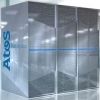 Enterprise CIOs are starting to twig that the cloud is not all it is cracked up to be and are looking at a new buzzword – the Fog – instead.
Enterprise CIOs are starting to twig that the cloud is not all it is cracked up to be and are looking at a new buzzword – the Fog – instead.
One of the problems with the cloud is that many of the services and apps, and data used in critical decision-making are better kept on premise or in smaller enterprise data centres. Cloud goes against the demand for mobility too as the data needs to be kept closer to the machine.
Now Cisco, Dell, Microsoft, Intel and ARM, as well as researchers at Princeton University, are betting that the future of enterprise computing will be a hybrid model where information, applications and services are split between the cloud and the fog. Cisco came up with the name “fog computing” you can probably tell.
Cloud based data centres are huge and are working ok for now. But when, and if the IoT appears on the scene things are going to get messy.
When everything from cars and drones to video cameras and home appliances are transmitting enormous amounts of data from trillions of sensors, network traffic will grow exponentially. Real-time services that require split-second response times or location-awareness for accurate decision-making will need to be deployed closer to the edge to be useful, something which would cause the cloud to break.
The only thing which will save the cloud really is increased technology, or coming up with a hybrid approach to data. That will enable distributed fog networks in enterprise data centres, around cities, in vehicles, in homes and neighbourhoods, and even on your person via wearable devices and sensors.
If this sounds like the old “distributed computing” over “Centralised computing” debate which happened as the Internet was starting to arrive, it pretty much is. What Cisco is suggesting is incredibly complex networks.





